Updated clinic providing compassionate care for HIV patients
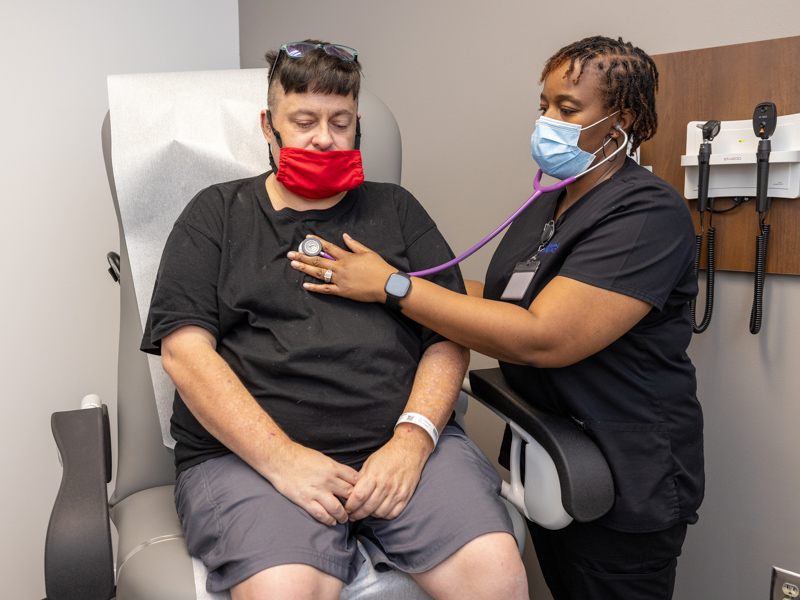
Walk into the University of Mississippi Medical Center’s Adult Special Care Clinic at the Jackson Medical Mall, and you’ll be warmly greeted from all sides.
Colorful artwork painted by Mississippi artists. A comfy waiting room where patients can exchange stories about their pets or catch up on each other’s weekend. An attentive staff making sure patients who live with the HIV infection feel unconditionally loved and accepted.
They’re getting care in a clinic recently refreshed with state-of-the-art exam room chairs rather than a flat bench; motorized, adjustable chairs where patients sit as their vital signs are taken; new exam room equipment; and framed photographs of Jackson landmarks.
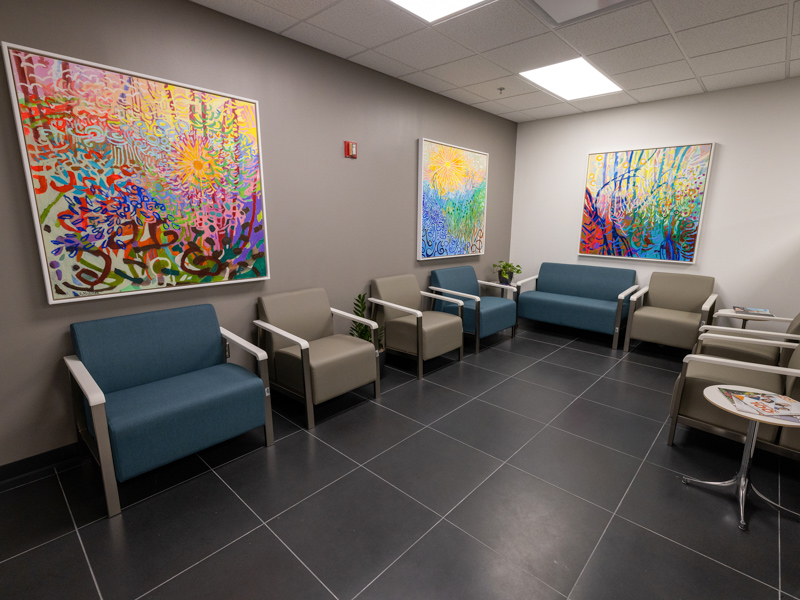
“We’re not waiting outside the clinic anymore. I’m not being stared at by everyone who walks by,” said Michael Sanford, a Jackson resident who gets regular care for HIV and other day-to-day medical needs at the clinic, known as ASC.
“I love the color. I hate institutional white. This is calmer. There’s even up-to-date reading materials in the waiting room.”
Using Ryan White HIV/AIDS Program funding, UMMC has operated ASC through the Division of Infectious Diseases for more than two decades. The Ryan White program, the largest federal initiative focused on HIV, is named after an Indiana teen diagnosed with AIDS in 1984 who became the face of public education about the disease before his untimely death.
In calendar year 2022, ASC gave HIV primary care to 2,212 people. About 86 percent of patients are Black and almost 14 percent are white. Of 181 new patients in 2022, 95 were newly diagnosed.
“By far, it’s the largest HIV clinic in the state, and one of the largest in the Southeast,” said Andy Cote, ambulatory operations director for the Medical Mall’s ambulatory clinics. “We have clients who come from 62 Mississippi counties. Some of them don’t want to go to their local doctors because of the stigma.”
Before the renovation, the ASC waiting area wasn’t private. “For an HIV clinic to have a waiting room in a public area – we hated that,” Cote said.
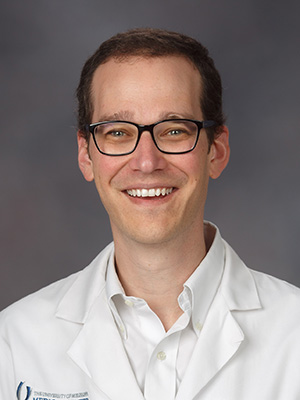
But with the help of grant funding, several walls were moved to create an enclosed waiting room. “This is a little more intimate, with alcoves to even give some semi-privacy in the waiting area,” said Dr. Ben Brock, an associate professor in the Division of Infectious Diseases and the clinic’s medical director. “We have separate intake and outtake doors to make the work flow better. We’ve modernized it with a new look.”
“It was a total re-do, including new flooring and painting,” Cote said. “The people who see it are amazed.”
ASC has expanded to 12 exam rooms to accommodate 2,200 patients, most of whom receive their primary care there in addition to management of HIV. That’s up from 1,600 patients just five years ago.
The clinic’s 2022 patient satisfaction survey that received 226 responses indicated more than 99 percent of respondents were satisfied with their care and would recommend it to friends and family with similar needs. More than 94 percent said they waited less than 30 minutes to see a provider.
The top words used to describe ASC care were excellent, respectful, friendly, caring and understanding.
“The number of patients at our clinic has been growing faster than we can grow,” Brock said. “We got 35 new patients in January. Sadly, a number of those are new diagnoses, but we are also getting patients who have transferred their care based on word of mouth and the reputation of the quality of the care we are delivering here.”
HIV, or human immunodeficiency virus, attacks cells that help the body fight infection, making a person more vulnerable to other infections and diseases. It’s spread by contact with certain bodily fluids of a person with HIV, most commonly during unprotected sex or sharing drug injection equipment.
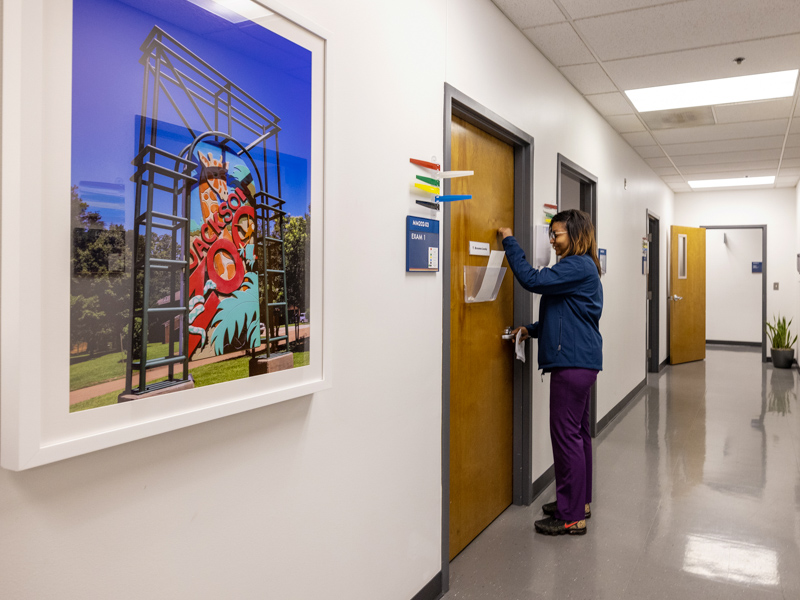
If left untreated, HIV can lead to AIDS, or acquired immunodeficiency syndrome, the late stage of HIV that occurs when the body’s immune system is badly damaged from the virus. Many people with AIDS who die don’t succumb from the virus itself, but rather infections that decimate their weak immune system.
Mississippi has the seventh-highest rate of HIV in the nation, at 16 infected people per 100,000 population. The highest is Florida, with 39.1 people per 100,000, statistics show.
About 10,000 Mississippians live with HIV, and Black and Hispanic residents are disproportionately impacted. In 2020, 51 percent of the nation’s 30,635 HIV diagnoses were in the South, latest data from the Centers for Disease Control and Prevention shows.
UMMC continues to see patients with AIDS. “It’s not anything like it was 10 years ago, but we still have hospitalizations of patients with AIDS-related complications,” Brock said. “AIDS is completely preventable nowadays with early diagnosis and treatment."
Thanks to advances in drug therapy, many HIV patients are middle-aged or older. Almost half of those seen at ASC are 50 or above.
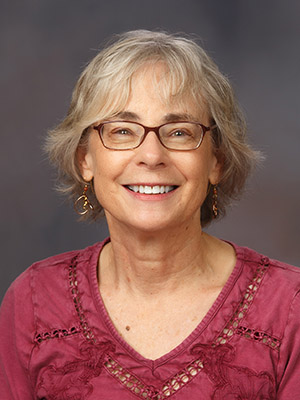
“When I started in HIV care 26 years ago, we were routinely prescribing 17 pills a day,” said Dr. Deborah Konkle-Parker, a nurse practitioner and researcher and a professor in UMMC’s School of Nursing. “Now, people can take a pill a day, or even a shot once every month or two. It’s critical to get started as soon as possible after diagnosis to maintain a good immune system.
“I don’t believe the rates of HIV have slowed down as much in Mississippi as in other parts of the country,” she said. “I’m hopeful that places that do testing are aware that UMMC is where they can refer patients for compassionate and confidential care.”
ASC works hand in hand with UMMC’s Express Personal Health at the Medical Mall. That clinic provides free HIV screening and testing. Those testing positive are linked that day with ASC. Those testing negative can receive services including prescriptions for medications that people who don’t have HIV take daily to reduce their risk of infection from sex.
Patients with HIV or risk factors also are seen at the TEAM Clinic. Short for Trustworthy, Evidence-Based, Affirming and Multidisciplinary Care, the clinic at Riverchase Medical Suites in Flowood is one of a few in the region that offer the LGBTQ adult population accepting, high quality and holistic primary care.
The camaraderie ASC providers have with patients is obvious. “We don’t have an assembly line at our clinic,” Brock said. “You’ll hear patients conversing with staff in the hallways on their way to check out.”
“We try to have relationships with all of our patients, and for them to want to come back,” Cote said. “We just didn’t have the physical presence to provide all we wanted, but now we have that piece of the puzzle.”
Sanford recently visited ASC for an overall check from nurse practitioner Tamika Broome-Lewis before receiving his every-other-month injection of an extended-release HIV drug from registered nurse Melissa Hickman.
“It’s wonderful. You don’t have to worry about taking a pill, or somebody wondering about what you’re taking,” Sanford said.
“You are loved on here,” Hickman said. “This clinic shows people that they are a person, not just a medical record number.”
Mississippi has a lot of work to do in HIV prevention and screening. “There are still a lot of people in Mississippi with HIV who are receiving no care, and there are a lot of costs associated with that, including the cost of treating people with more advanced disease and complications, and the cost of hospitalizations,” Brock said.
“We hope and expect that through a lot of different efforts in prevention work, individuals are understanding the importance of getting tested, and if they test positive, the importance of getting care and treatment,” Konkle-Parker said.
“We care a lot for the patients we see. We’re thrilled to be able to honor these folks who live with a lot of negativity by making them feel comfortable and good about the place they come to for their care.”

